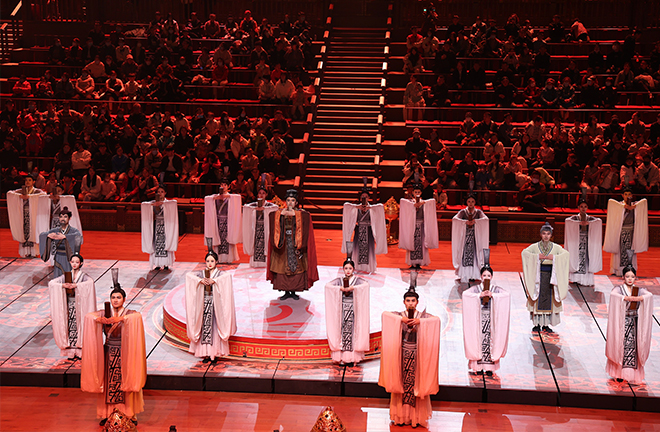Scholars interpret ancient ritual culture

A performance showcasing ritual and music culture in Qufu, Shandong Province, on March 20 Photo: CFP
QUFU—Scholars exchanged views on ancient ritual systems and ritual studies from multiple angles at the Fourth Workshop on the Ritual System and Ritual Studies in Qufu, Shandong Province, co-hosted by the Confucius Institute of Culture at Qufu Normal University and the Yuelu Academy at Hunan University.
Core of traditional culture
“Traditional Chinese culture features a ‘ritual and music civilization’ with rites as its cultural paradigm. Rites are at the core of traditional Chinese culture, giving expression of its traits and representations,” noted Cheng Qili, a professor from the Qilu Culture Research Institute at Shandong Normal University. Rites define the highest category of Confucian intellectual systems and serve as the core values of traditional Chinese culture. In a sense, the core of traditional Chinese culture accumulated over thousands of years is “ritual,” ancient Chinese politics was the politics of “ritual,” and the history of ancient Chinese social development was the history of “ritual.” In ancient China, the development level of ritual and its role in the national spirit and socio-political development were given unique cultural significance.
“Chinese culture and civilization are represented by the ritual and music culture and civilization,” said Feng Bing, a professor from the Department of Philosophy at Xiamen University. The Chinese ritual and music civilization has endured for millennia due to its inherent strength and vigor, rooted in an understanding of the laws of nature. Through their contemplation of the laws of heaven and earth, ancient Chinese developed naive yet rich natural philosophical concepts. These concepts had a profound impact on shaping the humanistic rationality of traditional Chinese culture and civilization.
Classic literature
Document research is the most crucial and fundamental aspect of ritual studies, providing new interpretations of the origins and evolution of ritual systems from the perspective of Confucian classics and philology, Cheng added. Ritual studies represent a profound academic system which encompasses both research on traditional ritual systems and research on the literature and intellectual systems centered around the “three ritual classics,” namely The Book of Etiquette and Ceremonial, The Rites of Zhou, and The Book of Rites. They underlie the rich political and ethical ideas and national spirit that have been passed down for generations.
Xunzi was a master of pre-Qin (prior to 221 BCE) ritual studies. In addition to a special article titled “Discourse on Ritual” in Xunzi, almost all of the other articles involve rites. According to Liao Mingchun, a professor from the Department of History at Tsinghua University, when writing the articles of “Lishu” and “Yueshu” of Records of the Grand Historian, Western Han Dynasty (202 BCE–8 CE) historian Sima Qian copied nearly the full texts of “Discourse on Ritual” and “Discourse on Music” of Xunzi. Where Xunzi’s ritual studies come from is a major research topic not only in the history of ritual studies and Confucianism, but also in the history of Xunzi studies. There is no evidence of whether Xunzi’s ritual studies stemmed from Zigong [a Confucian scholar mentioned in Xunzi], but the article “The Grand Digest” in Xunzi offers compelling proof that it originated from Zengzi.
Means of social regulation
The ritual system is a set of codes of conduct and institutional and ideological norms for human society formulated in the principle of ritual spirit, Cheng continued. In extended forms, the ritual system encompasses the five rites of Zhou (1046–256 BCE), namely auspicious rites, inauspicious rites, congratulatory rites, hosting rites, and military rites. Traditional Chinese culture is one with the ritual system as its paradigm. The objective-setting and institutional arrangements of ancient Chinese national governance systems function within the framework of the ritual system culture. In a way, the ritual system is not merely the logical starting point of ancient China’s national governance, but also the regulatory means and goals of its ancient society.
Zhang Hongbin, an associate research fellow from the Institute of World Religions at the Chinese Academy of Social Sciences, reviewed public order in the Spring and Autumn Period (770–476 BCE) proceeding from rites. Although the Spring and Autumn Period and the Warring States Period (476–221 BCE) are often referred to by a combined name, they do have a clear-cut boundary. According to Rizhilu [Notes on Knowledge Accumulated from Day to Day] by scholar Gu Yanwu (1613–82), the Spring and Autumn Period still honored rites and credit, which by contrast were never spoken of during the Warring States Period. Forming alliances among vassals was frequent in the Spring and Autumn Period. There were over 200 meetings to form alliances in Chunqiu [Spring and Autumn Annals], most of which involved “rites.” “Upholding rites” and “forming alliances” were paralleled at the time. The former demonstrated reverence for the established order represented by the ritual and music culture, while the latter sought to form new order. New order was backed by strength, yet claimed to uphold the traditions of the old systems.
“Rites” presents itself as ethical and moral codes, safeguarding social stability and development through guiding, restricting, and regulating people’s thoughts and behaviors. The generation of sacrificial rites allowed for virtual communication between the world of the living and the world of spirits and gods. Chen Xubo, director of the Confucian Classics Research Center at Chongqing University, said that sacrificial activities at ancestral temples were manifestations of the living’s filial piety to their deceased parents in the afterlife. With constant interpretations given by pre-Qin Confucianism on filiality and righteousness, filial piety became the social norm entailing universal obeyance among the people. The conceptual shaping of loyalty and filial piety extended their application from families and society to politics, evolving into the core of Confucian political thought. The building of this world by pre-Qin Confucianism enhanced the justification of Confucian ethical thoughts and their impact on the real world.
Edited by YANG LANLAN
